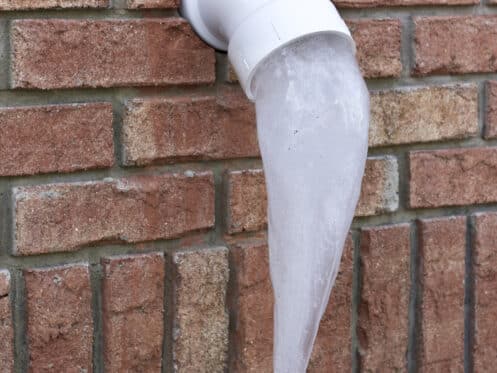Temperatures in Lubbock, TX, typically don’t drop very low in the winter. However, there are still numerous times each year when it gets cold enough for the pipes in your home to potentially freeze. A frozen water line will make your sink or shower unusable, and you won’t be able to use any plumbing fixtures if your main water line freezes where it enters your home. Still, the biggest issue is that a frozen water line can easily burst and start flooding your home, causing massive water damage. The good news is that all you need to do to ensure your pipes don’t freeze this winter is to follow these simple tips.
Keep Your Heat On
Any time the outdoor temperature is below freezing, it’s important that you leave your thermostat set to at least 60 degrees. The reason you don’t want to go any lower than 60 degrees is that some parts of your home can be a bit colder than the temperature your thermostat shows. The places most prone to this are along the foundation walls in the basement or any areas that aren’t properly sealed from the outside. If you only had the temperature set to 50 degrees and the outdoor temperature was well below freezing, there is a much greater risk of your pipes freezing.
If your heating system ever stops working during the winter, it is also important that you contact an emergency heating repair service immediately. This allows you to get the issue repaired as soon as possible to prevent your home from becoming so cold that your pipes start to freeze. It’s also a way to help keep your home comfortable all winter long.
Insulate Pipes in Colder Parts of the Home
If your home has a crawl space instead of a basement, all of the water lines that supply your main floor will usually be just underneath the floor within the crawl space. Some homes also have a few water lines in the attic, but this is typically only the case when the water heater is in the attic. If you do have any water lines in your attic or crawl space, it is essential that all of these pipes are fully insulated to prevent freezing. You also need to make sure that insulation is in good condition and properly installed.
If your home has a basement, you should consider insulating any exposed pipes that run along the foundation walls.
Turn Off the Water Supply to Outdoor Plumbing Fixtures
Hose bibs and other outdoor plumbing fixtures are at great risk of freezing during the winter. This is why you should always close the valve on the pipes that supply all of these fixtures before winter arrives. After closing the valve, you should open each fixture to ensure that any remaining water drains out. Then, close the fixture to prevent cold air from flowing up the pipe and into your home’s plumbing system.
Leave Cabinets Open and a Trickle of Water Running in Extreme Cold
Any time cold temperatures are predicted, you should take a few additional precautions to reduce the chance of your pipes freezing. Turning on your faucets and showers so that there is just a trickle of water running will allow water to flow through the pipe. It’s also a good idea to open the doors on the cabinets underneath your bathroom and kitchen sinks. If the doors are closed, the space underneath the cabinet can get cold enough for the pipes to freeze. Opening up the doors will allow some warm air to circulate around the pipes, so they stay warm.
If you find yourself dealing with a frozen pipe this winter or have concerns with the safety of your plumbing system once temperatures drop, the plumbers at Action Air Plumbing and Septic can help to thaw it out quickly and lessen the chances of it bursting. Our expert HVAC technicians can also help ensure that your heating system works effectively and your home stays warm enough that your pipes shouldn’t freeze. We also provide services such as repiping, installing or repairing sewer lines, drain cleaning, repair of slab leaks, and septic site evaluation. Give us a call today if you have any questions or need any HVAC or plumbing service in the Lubbock area.



